Penmachine
09 April 2010
What does it mean to be old?
New Scientist has published a widely-linked article (via Kottke) this week called "The Shock of the Old," about how the world's population is aging. Author Fred Pearce is perhaps a bit too optimistic about what that means, but it's nevertheless a worthwhile read. It reinforces something I've written about before. As Pearce puts it:
We should be proud that for the first time most children reach adulthood and most adults grow old.
But old doesn't mean what it used to. I regularly hear news reports about an "elderly" person of age 70. But that's how old my parents are, and they don't seem at all elderly to me. Yes, my mom retired some years ago, but that doesn't seem to have slowed her down. My dad is still running his own business and driving to service calls almost every day. He'll happily climb a ladder to the roof of the house to clear out the gutters.
And of course, these days they're both in better shape than I am, at age 40.
I think societies like Canada's, where our population is aging rapidly, will have to adjust, to support people based not on the number of years they've lived, but on the capabilities they have. In some ways, we already do that—I'm receiving Canada Pension disability benefits, for instance. I don't know what that adjustment will look like, and I may not even live long enough to see the change, but it's coming.
Labels: age, canada, death, history, magazines, work
16 December 2009
Lululemon's clever retail satire
 Last year, Old Navy tried making some unofficial Olympic clothing, but Vancouver's Olympic Organizing Committee (VANOC) and the International Olympic Committee shut that down because the jackets were too close to official trademarks for the upcoming Winter Olympics.
Last year, Old Navy tried making some unofficial Olympic clothing, but Vancouver's Olympic Organizing Committee (VANOC) and the International Olympic Committee shut that down because the jackets were too close to official trademarks for the upcoming Winter Olympics.
Now Vancouver yoga retailer Lululemon has tried a cheekier approach, releasing a line of clothes pushing the line of Olympic trademark infringement, without quite crossing it. The line is called the "Cool Sporting Event That Takes Place in British Columbia Between 2009 & 2011 Edition," which gave me a laugh.
I like the sporting events of the Winter Olympics, but VANOC and the IOC have been overzealous in emphasizing the business aspects of the event, rather than the sport. So I appreciate Lululemon's retail satire. The stuff looks good too, so I might buy some.
I wonder if it will be hard to get into Olympic events wearing the Lululemon clothes in February?
Labels: canada, clothing, controversy, money, olympics, politics, shopping, vancouver
30 November 2009
How innocuous gay marriage has become in Canada
Thank you everyone for your outpouring of support and more than 50 comments on my last post, about the resurgence of my cancer. I'm pleased to know so many of you are thinking about me and my family. But it's also a bit of a bummer to have that be the thing sitting at the top of my blog for days and days, so now on to something else.
While surfing around the Web in the past week, I've come across a few banner ads from TD Canada Trust, presumably targeted at me because I have a Canadian IP address. Here are a couple of examples:
They're pretty run-of-the-mill bank ads, except for one thing: the couples in them are all men. (Well, in the vertical one, I think they're both supposed to be men.) The ads are presumably aimed at gay couples—who, as you will recall, have been legally able to get married across Canada since 2005—but the photos are the only element specifically focused at them.
Clicking on the ads doesn't take you to any special place on the TD site; indeed, once you get there there are just single individuals in the trademark green TD armchair.
Fifteen years ago, IKEA received bomb threats when it included a same-sex couple in a TV ad. Even this year, the company faced controversy in Poland for a similar print campaign. Including male or female homosexual couples in non-gay media advertising (however innocuously) has long been a hot-button issue, especially in more conservative areas.
But look at what's happened here in Canada. Same-sex marriage has been legal for almost five years. Many of us old-school straight couples now know gay people who are married (and yes, some who have gotten divorced). For all of us, life has gone on as normal. Yes, I admit that for me, even in Vancouver, I still notice a gay couple holding hands or leading their young children down the street—it hasn't yet faded into the background completely. Obviously, neither have these TD Canada Trust ads.
But for TD on the Web, including gay couples in their ads seems to have become routine, just part of the regular range of ad campaigns. That's a good thing, and our Canadian experience in general is good evidence against those elsewhere who claim that legalizing same-sex marriage will somehow ruin life for the rest of us. Even the big old conservative Canadian banks don't think that anymore.
Labels: canada, controversy, family, media, politics, web
06 November 2009
Raising free-thinking kids
(Cross-posted from Buzz Bishop's DadCAMP.)
Back in the mid-1970s when I grew up in Vancouver, almost all the stores were closed on Sundays, because of a piece of legislation called the Lord's Day Act. Every day before class in elementary school, we said the Lord's Prayer. These were vestiges of a general assumption, made since British Columbia was colonized a century earlier: even if everyone in B.C. wasn't Christian, the province would still run as if they were.
But Metro Vancouver has become remarkably secular in the three decades since then. In the 2001 Census, 40% of the population identified itself as having "no religious affiliation," and the proportion is probably even bigger now. (That's two and a half times the average across Canada.) My wife and I fit the trend: we have raised our two daughters, ages 9 and 11, in a non-religious household. Like us, few of our friends attend a mosque, temple, or church.
Buzz asked me to write this post because he saw that I just joined the Facebook group for Parenting Beyond Belief, a website run by Dale McGowan from Atlanta, Georgia. I signed up not because I needed much advice about raising children without religion (something many of us now do, especially in Vancouver), but to note publicly that it's been the approach in my family since our kids were born.
[Read more at dad-camp.com...]
Labels: canada, family, history, religion, vancouver, web
02 November 2009
Listen to the Salish Sea
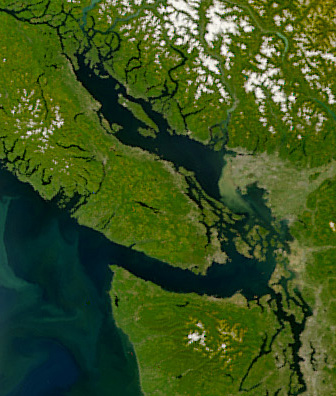 When I interviewed CBC Radio producer Paolo Pietropaolo back in January on the Inside Home Recording podcast, he talked about his upcoming documentary on the Salish Sea here in British Columbia.
When I interviewed CBC Radio producer Paolo Pietropaolo back in January on the Inside Home Recording podcast, he talked about his upcoming documentary on the Salish Sea here in British Columbia.
The original version appeared in the spring, and a documentary edition was broadcast this morning on the Canada-wide radio show "The Current." You can listen to both. They might work best in headphones, even though they weren't broadcast in stereo.
Labels: canada, cbc, environment, history, oceans, radio, seattle, vancouver
15 October 2009
Sinking feeling
 Today, as part of Blog Action Day, I've agreed to write about the environment and climate change. I've done that here many times before, generally in a positive way, or at least a frustrated one. But not today.
Today, as part of Blog Action Day, I've agreed to write about the environment and climate change. I've done that here many times before, generally in a positive way, or at least a frustrated one. But not today.
Maybe I'm just in a pessimistic mood, but honestly, I'm starting to think we're screwed. There are honest moves afoot, especially in Europe, to change patterns of human energy consumption and reduce carbon emissions. But here in North America, where we use more energy per person than all but a few very small countries, we're doing essentially nothing.
I first became aware of increasing human effects on the Earth's climate around Earth Day in 1990, almost 20 years ago, which was a pretty high-profile event. For awhile after that, there were lots of recycled products in the grocery stores, and talk of converting away from oil, gas, and coal to heat our houses, generate our electricity, and power our vehicles.
And then things slid back roughly to where they were before. Paper towels and toilet paper went from recycled brown to bleached white again. As the economy boomed, people who never went off-road or hauled lumber bought huge Hummers and pickup trucks. Politicians, businesspeople, activists, and others expended a lot of words about the problem of climate change. Yet here in Canada, while we've improved the efficiency of what we do, our overall emissions keep going up, despite our promises.
In the United States and Canada, we're distracted by economic crises and healthcare reform and celebrity scandals and cable reality shows. The developing world is growing too fast not to increase their own emissions. Europe and other countries making efforts aren't enough. By the time sea levels start rising in earnest and the social and political disruptions start, we probably won't be able to keep climates from changing all around the world.
So in all likelihood, we'll wait too long, and we'll have to adapt as our environment alters wildly around us. That will be expensive, disruptive, and probably bloody in all sorts of ways.
I'm not saying we should give up and do nothing, but right now it seems that, collectively, we (and I'm fully including myself here) are very nearly doing nothing by default. Since I have cancer, I don't know if I'll be around to see what happens in a few decades. But my kids will. They will most probably, as the curse goes, live in interesting times.
Labels: americas, blog, canada, environment, linkbait, news, politics
06 October 2009
Telus and Bell go iPhone in Canada
Things have been all a-twitter about Canadian mobile carriers Bell and Telus (my cell phone provider) starting to sell Apple's iPhone, supposedly next month. My wife Air told me the scoop yesterday, and I was surprised, and skeptical.
But it sounds like it's really happening. This is a bigger deal than it seems if you don't follow the mobile phone industry, for two reasons:
- In most markets, Apple has an exclusive arrangement with a single carrier to sell the iPhone. Until now in Canada, that has been with Rogers Wireless and its subsidiary Fido, and in the U.S. it remains AT&T Wireless. Having competing carriers all with the iPhone is unusual.
- The iPhone uses the most common mobile phone radio standard in the world, known as GSM. However, until now both Bell and Telus have used a competing and incompatible standard, CDMA, also used by Verizon and Sprint in the U.S.A.
In North America, many mobile phones (such as BlackBerry devices) come in both CDMA and GSM versions for different carriers, but the iPhone has been GSM-only since its introduction in 2007. It turns out that Bell and Telus have been installing some GSM technology on their cellular towers for at least a year, and planning to have it ready for many customers in 2010.
But now it looks like they'll be early, and the iPhone may be their first big rollout of 3G (third-generation) GSM wireless. And although it will be awhile, my old CDMA phone is likely on the way to becoming obsolete. Qualcomm, which owns the CDMA patents and licenses them to carriers and device makers, had better be looking for some new way to make money.
Labels: apple, canada, geekery, iphone, telecommunications, telus
13 May 2009
B.C. voters prefer the lame status quo
The BC Liberals won the British Columbia election again last night, as I expected. B.C. citizens gave them basically the same proportion of the vote and a slightly larger percentage of seats in the Legislature. Much more depressingly, voter turnout was yet again lower and BC-STV was resoundingly defeated. That's over. We're back with what we had before.
The BC Liberals are not my preferred choice, but they are at least tolerably competent in many respects. I guess I can live with that. However, the STV referendum gave us the chance to make our provincial government more representative and more interesting in the future, and we British Columbians turned it down.
My gut reaction is that yesterday, we B.C. voters were, on balance, lazy and chickenshit. That half of eligible voters didn't even bother, and that of those who did, a significant majority thought our current skewed system is just fine—well, that chafes.
I don't know if the numbers bear it out, but to me it feels like more people cared about how the Canucks did in the hockey playoffs than about deciding on the people we pay to respond to climate change, or to combat poverty, or to run the bloody province. And that we'll will bitch and complain about roads or homelessness or white-elephant megaprojects or the Olympics or cronyism and then not even vote when we get the chance.
On the bright side, perhaps the Liberals will be emboldened by a third straight victory to go beyond baby steps in their environmental policy. Maybe they can take a real lead in Canada on that most important of issues. They have a mandate to. I'm not optimistic, but I hope they run with it.
Labels: canada, environment, history, politics
12 May 2009
Today's vote
We're having a provincial election in British Columbia today, to decide which of our political parties will form the government for the next few years here on Canada's west coast. As in the British and Canadian federal parliamentary systems, we elect a local Member of the Legislative Assembly (MLA), and whichever party elects the most runs the province.
Tim Bray summarizes the situation much the way I would—however, despite my distaste for the social democrat NDP's pandering on environmental policy, I'm still voting for them, rather than for the Greens as Tim is.
That's a strategic choice. Like him, I think the referendum on electoral reform we're also holding today is even more important: the BC-STV (Single Transferable Vote) proposal is, I think, a good one, and would allow a vote for the Green Party (or other less mainstream parties and candidates) to mean something in subsequent elections. I hope it passes, as it nearly did in 2005. If it fails, I think any idea of electoral system reform in Canada will be dead for a long, long time, which would be a shame.
My wife and I voted about half an hour ago, and foot traffic at our local poll was brisk, but there were no lineups. Unlike in the United States, we continue to use simple paper ballots, marked with pencils, for all our elections here in Canada, and the results always come in quickly and efficiently. While counting might take a tad longer, that will still be true next election if BC-STV passes, despite the "it's too complicated" tactics of the No To STV campaign. As for today's vote, we'll know by late this evening what the results are.
If you're a B.C. citizen of eligible age, please make sure you vote today—you have a little over five hours until the 8 p.m. closing time at the polls. (Bring your yellow voter card and a piece of ID with your address, like a driver's license.) Even if you don't know or care enough about the parties or candidates to elect an MLA, if you support BC-STV, then please go out and vote just for that. It's important.
Labels: canada, history, politics
01 May 2009
Canada's asbestos problem
 Mine is a pretty sensible country, just like our stereotype, but not always. A key example is our bizarre asbestos industry.
Mine is a pretty sensible country, just like our stereotype, but not always. A key example is our bizarre asbestos industry.
Asbestos is nasty shit: "All forms of asbestos," says Leslie Stayner, director of epidemiology and biostatistics at the University of Illinois School of Public Health, "cause both mesothelioma and lung cancer." Anytime asbestos is discovered in old construction here in Canada, the location is shut down for thorough removal of the mineral. Numerous countries around the world have banned use of the substance outright.
Yet in a few Quebec towns, asbestos mining continues, supporting about 500 jobs and bringing in about $100 million a year. (My wife visited one of those towns, Thetford Mines, on a French exchange when she was a kid and the industry was larger.) Since it's illegal to use here, our asbestos gets shipped overseas, to India, Indonesia, Thailand, and elsewhere where it's still permitted. There, it presumably kills people by giving them cancer.
The puzzling thing is that the Canadian government acts like it's still the 1940s, arguing that the form of asbestos we mine and sell, called chrysotile, can be handled and used safely. Perhaps it can, though it seems unlikely—plus I highly doubt construction projects in developing countries do so anyway.
Even our erudite new Leader of the Opposition, Michael Ignatieff, seems to have been cowed by the asbestos lobby, moving from a strong anti-asbestos position a couple of months ago to a "we need more research" stance. Yet we've known for decades that the stuff is a substantial, carcinogenic health hazard in all its forms.
It's sad to say, but if Canada's asbestos industry were anywhere other than Quebec, it probably would have shut down years ago, especially since it is now such a small part of our economy. Continued support from our two major federal parties, the Liberals and the Conservatives, seems to me a cynical political move, to avoid offending Quebec nationalists and the chrysotile lobby based in that province.
So one of our long-simmering domestic political quagmires keeps us selling a toxic mineral to the developing world. Not very sensible.
Labels: canada, cancer, controversy, environment, linkbait, politics
01 March 2009
Deep bathtubs and the sound of surf
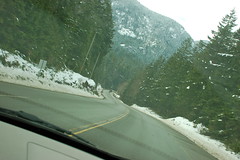 I still have some more photos to upload, but early this evening we got back home after seven and a half hours and nearly 300 km by car and ferry returning from Tofino and Parksville. It was a great trip, one that will leave memories. As a nice capper, we managed to meet up with my friend Simon on the ferry in Nanaimo and, once we crossed the water, gave him a ride into West Vancouver to visit his family.
I still have some more photos to upload, but early this evening we got back home after seven and a half hours and nearly 300 km by car and ferry returning from Tofino and Parksville. It was a great trip, one that will leave memories. As a nice capper, we managed to meet up with my friend Simon on the ferry in Nanaimo and, once we crossed the water, gave him a ride into West Vancouver to visit his family.
We live in a huge part of the world. I mean huge oceans, huge mountains, huge trees, huge birds, huge beaches, and huge distances. At highway speeds (except for the really twisty parts, and lunch), it took us three hours to drive in the rain about half the way, across one of the narrowest parts of Vancouver Island. It's apparently a faster trip right across Ireland. We passed between snow-blanketed mountains 1400 m high—taller than any in Britain, to make another cross-Atlantic island comparison.
It's common for us British Columbians to take day trips or short vacations over distances that would cross several countries in Europe, as my family did this week. I'm glad to be home, but as I noted on on Twitter, I miss the huge, deep, comfortable hotel bathtubs. And the heated tile floor in Tofino. And the sound of surf, gentle or roaring.
Labels: animals, canada, europe, family, friends, memories, oceans, travel
12 January 2009
Opening up music
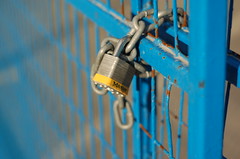 Since the early days of this blog, I've written about how I dislike copy prevention technologies for software, music, and movies—and have hated them since my early days of computer use more than 25 years ago. That's because it's never wise to treat your customers as your enemies.
Since the early days of this blog, I've written about how I dislike copy prevention technologies for software, music, and movies—and have hated them since my early days of computer use more than 25 years ago. That's because it's never wise to treat your customers as your enemies.
Today, crusading Canadian copyright lawyer and professor Michael Geist writes about how finally, slowly (at least for music), the big companies might be getting it. Until 2008, the recording industry was intent on suing file sharers, locking files with DRM copy prevention, and pushing through crummy copyright legislation. Now:
The decision to drop the lawsuit strategy was long overdue as it had accomplished little more than engender significant animosity toward the industry [and] helped to convince some of Canada's best-known artists to speak out against the practice.
[...]
Apple, the dominant online music seller, announced that it will soon offer millions of songs from all four major record labels without digital locks [which] reflects the recognition that frustrating consumers with unnecessary restrictions is not a particularly good business model.
[...]
In addition to the privacy, security, and consumer concerns with such legislation, laws to protect digital locks seem increasingly unnecessary given the decision to abandon their use in the primary digital sales channel.
I don't know if these changes mean that the recording industry is figuring out effective ways to do business in the Internet file-sharing world, or whether it is just giving up on failed strategies, but I find the trend encouraging. In practical terms, it means that, with six functioning computers for four people in this house, we won't have to worry too much about iTunes letting songs purchased from the iTunes Store play on only five computers anymore.
Alas, movies, audiobooks, and such are another story entirely.
Labels: apple, canada, controversy, copyright, itunes, music
27 December 2008
Oh, this could be dangerous
22 December 2008
Winter
Two photos I took on yesterday's winter solstice:
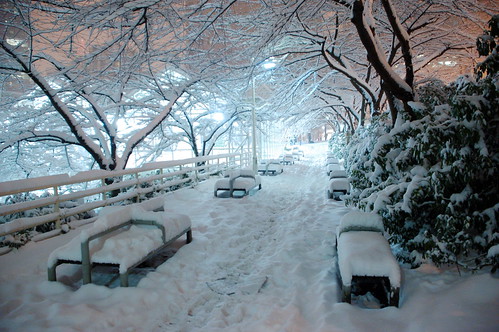
Burrard SkyTrain station, 10 p.m.
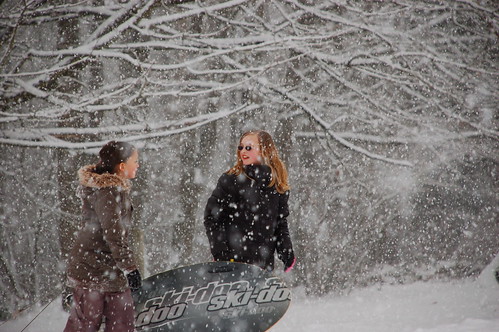
Sledding at Forglen Park, Burnaby, 2 p.m.
CBC's Weather Centre says "it's guaranteed that all the country will see a white Christmas. We have snow on the ground everywhere and it's going to stay into Christmas Day." That's less common right across Canada than you might think.
Labels: canada, holiday, snow, vancouver, weather
05 October 2008
How left-wing Canada elects a right-wing government
We Canadians are having an election too, on October 14, a few weeks before our southern neighbours in the U.S.A. By the standards of most countries in the world, Canada's political climate is a social democratic one, particularly on social and moral issues. (By the somewhat skewed perspective of modern American politics, therefore, we probably all seem like we're Shining Path guerrillas.) In the last election in 2006, about 36% of the population voted for the Conservatives, the centre-right party that currently forms a minority government in Parliament.
What it means is that even when we elected a conservative (for us) government, 64% of Canadians still voted for parties more left-wing than that, from the centre-left Liberals to the democratic socialist New Democratic Party (NDP). Even the Bloc Québecois, whose primary platform is Québec independence (or sovereignty, in Canadian politispeak) are left-leaning in their other policies, while the environment-angled Green Party—a more significant force in 2008 than two years ago—is conservationist, rather than conservative.
Hidden coalitions
Unlike many other democracies, especially those with proportional representation systems that our British-style parliamentary system lacks, Canada really doesn't favour formal multi-party coalition governments. However, we often get them, in effect, by other means. That occurs when several left- or right-leaning parties merge to regain power after living in a vote-splitting wilderness for a few years.
I recall, for example, the early-’90s era when the federal Reform and Progressive Conservative ("Tory") parties split the vote on the right, so that even with the Bloc dominating in Quebec, the Liberals maintained power for a decade by winning a majority of seats elsewhere. At the same time, provincially here in British Columbia, the formerly dominant Social Credit Party, B.C. Reform (a brief experiment), and the Liberals all divided the centre-right and right vote, keeping the provincial NDP in power over a couple of election cycles.
Those situations ended a few years later when, respectively, Reform and the Tories merged into the current Canadian federal Conservative Party, and the various centre-right and right-wing parties in B.C. coalesced around the B.C. Liberals, who form our current provincial government. But that situation also ensures that no elected party can become too extreme: in the Conservative Party, for example, the far-right social conservatives (many of whom used to belong to the Reform Party) form only a fraction of the government's caucus, and if they tried to impose their views on the legislature as a whole, they could generate another schism that loses them the next election.
Flipping the split
And so we have a governing party whose members often disagree profoundly with many of the laws over which they preside. This is a country of legalized gay marriage, socialized medicine, no restrictions on abortion, minimal overt religious influence over politics, wealth redistribution among the provinces by the federal bureaucracy, institutionalized bilingualism and multiculturalism, and one of the larger immigration rates in the developed world. Yet our Conservative government dares not alter those tenets in any fundamental way.
Unfortunately for lefties like me, however, in this federal election it is the left wing that is split, among the NDP, Greens, Bloc, and Liberals. That is unusual in Canadian history—the Liberals are frequently nicknamed our "natural governing party" because they have won so often overall. But as further evidence of a general left-wing bias in the Canadian electorate, the left has always been split since the rise of the NDP and its predecessor the Cooperative Commonwealth Federation (CCF) more than 60 years ago, and yet the centre-left Liberals have still been in power most of that time. However, in the 2008 election, the wider left split may have particularly dire, long-term real-world consequences.
The Conservatives are likely to win again, perhaps with a majority instead of a minority of seats in Parliament, but with only a minority of the overall vote. In general I could live with that. But critically, while the more socially regressive ideas of Prime Minister Stephen Harper (a former Reform Party MP) are reined in by his party's "big tent," his government is the worst option on environmental issues. Only the Liberals—not even the Greens!—have proposed a carbon tax, which I think will be necessary to shift our energy usage. But even that comes after more than ten years of inaction on climate change when it counted most, when the Liberals were actually in power in the '90s and early 2000s.
Strategy and environment
With our non-proportional parliamentary system, many Canadians vote strategically. I cast my ballot in the advance poll this weekend, but I’m in a bit of an unusual situation, living in the Burnaby-Douglas riding long represented by the NDP’s Svend Robinson and, since his theft-related retirement, by his former assistant Bill Siksay. Both have been heavily involved in the local community, outspoken in Parliament (Svend notoriously so), and elemental in their party’s platform decisions.
Voting NDP has been an easy choice for me ever since I became eligible 20 years ago in this riding—I know my vote is not “wasted” (NDP founder Tommy Douglas was an MP here too at one point, so his party has always been a strong contender), and as a lefty I agree with the party platform on many issues. Were I in a different riding, I might vote more strategically, choosing Green or Liberal. As it is, my decision was simple, because my riding and national interests align.
Yet because of our current political morass, I think we stand to make poor national policy decisions on climate change, when time is running short to make the right ones.
Labels: canada, environment, politics, vancouver
